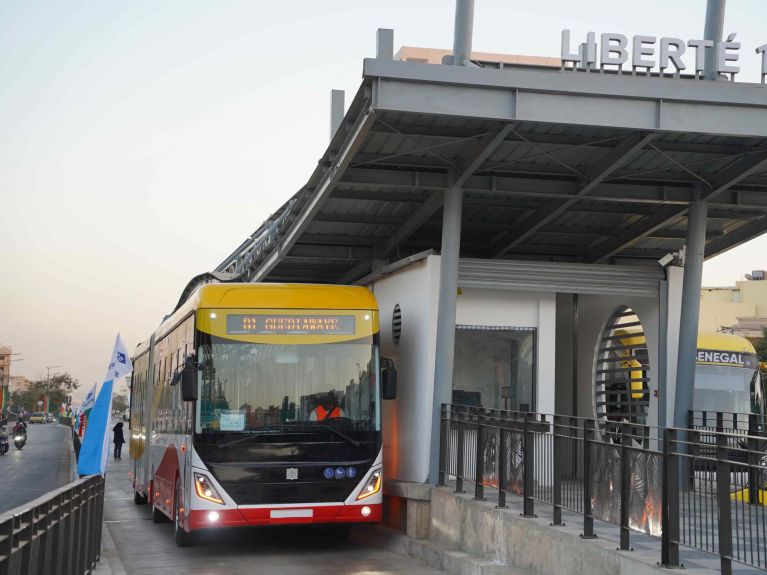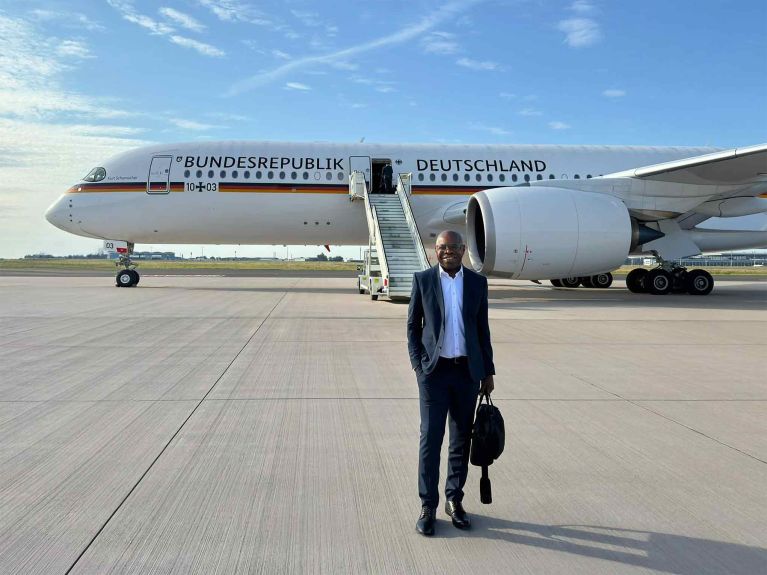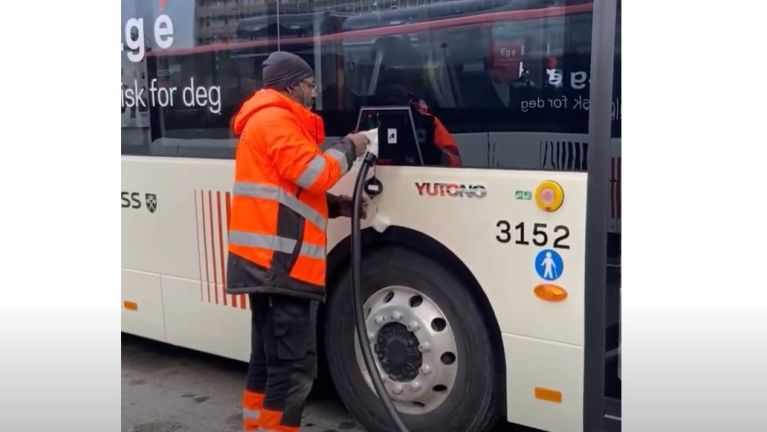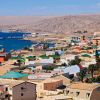Green mobility in Senegal
How a German software company is revolutionising local transport in Dakar.

Since May 2024, Dakar – the traffic-plagued capital of Senegal – has been served by a system of electric buses that travel via fast lanes. Efficient charging of the buses is ensured by software that is produced by the company CarMedialab based in Bruchsal in the southern German state of Baden-Württemberg. In this interview, Managing Director and COO Henri Depe Tchatchu talks about the opportunities offered by the project and how German-Senegalese cooperation works.
Mr Depe Tchatchu, what is different about your project in Dakar?
It’s the first of its kind in Africa. Around 140 electric buses now connect the north and south of Dakar via dedicated routes that are separate from the rest of the transport network. If you switch from car to e-bus, it only takes 45 minutes to cover the 18-kilometre route through the entire city – instead of spending hours in traffic jams. Financed by the European Union and the World Bank, the project has also created around a thousand jobs. Our software is used by transport companies in around 30 cities around the world, including Barcelona, Dublin, Brussels, Mainz and soon Seattle. But electric high-speed bus systems were new to us. They’re much cheaper than building urban railway lines, for example, and they have the potential to help solve traffic problems and reduce environmental pollution in a lot of big cities in the Global South. Abidjan, Accra, Kigali and Nairobi are among those currently considering similar solutions.
Electric high-speed bus systems could help solve transport problems in a lot of big cities in the Global South.
Dieses YouTube-Video kann in einem neuen Tab abgespielt werden
YouTube öffnenThird party content
We use YouTube to embed content that may collect data about your activity. Please review the details and accept the service to see this content.
Open consent formWhat does CarMedialab’s charging management software actually do?
The software controls and monitors all charging processes, ensuring the buses are ready to drive, battery power is used sparingly and the cheapest possible electricity is used. It also prevents the power grid from being overloaded. In Senegal, there are occasional bottlenecks in the power supply – but the buses can often charge at night when the general level of demand is lower.

You moved from Cameroon to Karlsruhe in 1996. How did that come about?
I was curious and wanted to explore the world! As I went to a French-speaking school in Yaoundé in Cameroon, the obvious choice would have been to go to France. But Germany was at the top of my list because I loved playing football and I was a fan of the German national football team. First I did a German course at the University of Karlsruhe’s preparatory college. Even back then, there were a lot of international students in the city and I didn’t find it difficult to learn German, so I felt at home very quickly. But I’ve always had an interest in technology, especially cars. I then went on to do a degree in communications engineering at Karlsruhe University of Applied Sciences – a subject that’s very important in the field of vehicle electronics.
The demand for emissions-free and noise-free buses is growing enormously worldwide.
Was electromobility already an issue back then?
No, the word hardly came up – not even in the early 2000s when I was working as a consultant in the automotive industry. I started at CarMedialab in 2008, and two years later we built a charging controller for the first prototype of Daimler’s electric smart car. This is how we first came to be involved with electromobility as a company. Our focus soon shifted to making local public transport greener. The demand for emissions-free and noise-free buses is growing enormously worldwide.

In the summer you were a member of the German delegation that accompanied Foreign Minister Annalena Baerbock to Senegal. What opportunities does Africa offer German companies?
In some African countries such as Rwanda, Ghana, Côte d’Ivoire and Senegal, industrialisation is progressing rapidly. Since German technology enjoys an excellent reputation in these countries, there are excellent business opportunities. But there are huge differences between the various African countries. Opportunities are certainly there for German business, since a lot of things are just in the process of being established. Some people still associate “Africa” primarily with wars and disasters, however, and this image tends to put companies off. You have to look at the individual countries, visit them and build partnerships.
Your company is based in Germany, but you employ a lot of skilled workers elsewhere, too?
In our industry, it is common to employ specialists remotely without them having to come to Germany. For example we have been employing software developers in Portugal and the USA for more than 10 years. Since mid-2023 we’ve been building up our customer support in Nairobi, Kenya, via a service provider, deploying young people who take care of customer support worldwide. We’re so satisfied with their work that we’re now thinking of expanding the model. The countries with the lowest average age in the world are in Africa. A lot of young people are highly motivated and now well trained, too, so there’s a lot of potential.



